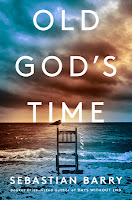Book Review: Old God’s Time by Sebastian Barry

Rating: 4.5⭐️
*Longlisted for the Booker Prize 2023*
“No one minds life as long as they are not trying to leave it. Nor death, as long as they are not dying.”
Sixty-six-year-old retired police officer Tom Kettle is nine months into his retirement when he is visited by two young officers in his new home in the annex of a Victorian castle in coastal Ireland. The reason for their visit is to request his help for a cold case from his younger days – a case revolving around the unsolved death of a Catholic priest. The priest in question was one of two who were known to have sexually abused children. The case in question is a sensitive one that hit too close to home for Tom. He is a kind man, who was deeply devoted to his family and is aware of the corruption within the justice system and in the Catholic Church, who took no action when presented with proof of the priests’ crimes. The visit triggers a floodgate of memories for Tom who reflects on his life as a police officer, his family, and the history of abuse both he and his late wife had endured as children and the shadow it cast on their adult life and family. In the present day we also follow, Tom’s interactions with his former colleagues and neighbors among whom is a young woman fleeing from her abusive husband, who Tom agrees to help.
Old God’s Time by Sebastian Barry is an exquisitely penned novel that revolves around themes of trauma, loss and the power of love, family and memory. The tone of the novel tends toward sorrowful and melancholic. Deeply depressing with graphic descriptions of sexual abuse of children and the despair of an old man haunted by his memories of abuse and his personal tragedies, this is not an easy book to read. The narrative is presented from Tom’s perspective in an almost stream-of-consciousness narrative with his memories collapsing upon one other to the point that we, along with Tom, pause to question and reflect on the reliability/accuracy of his memory and therefore his recollections. The effect is an immersive, almost claustrophobic dream-like narrative that reels you in from the very first page building up to an ending that will stay with you long after you have finished the book.
“People endured horrors, and then they couldn’t talk about them. The real stories of the world were bedded in silence. The mortar was silence and the walls were sometimes impregnable.”
Comments
Post a Comment